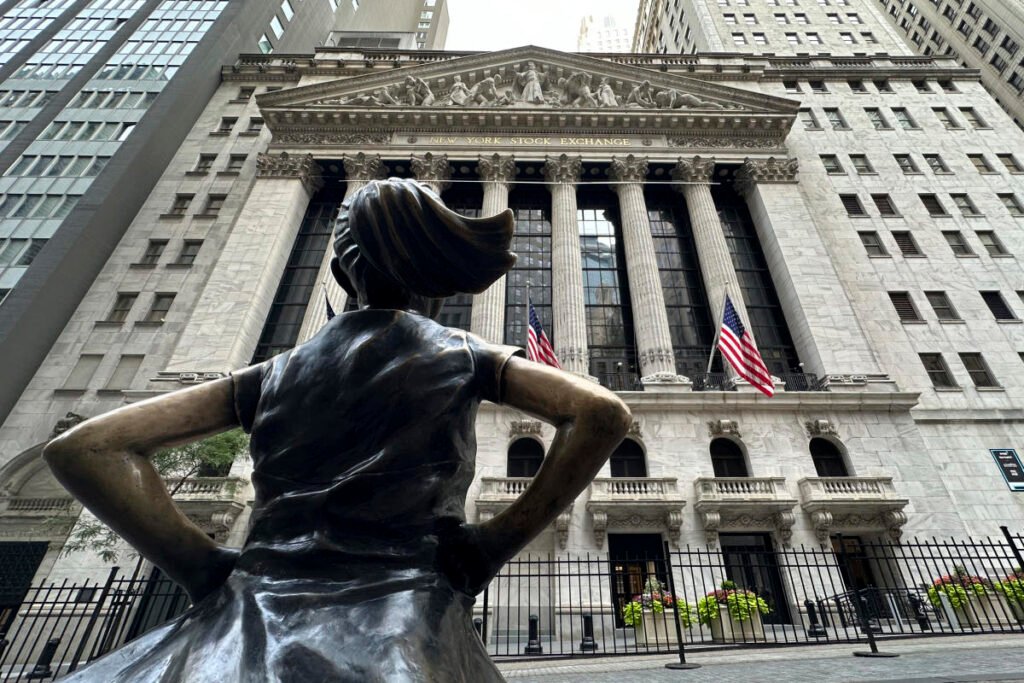Wall Street was slightly lower before the close on Wednesday as markets digested corporate earnings and awaited key inflation figures from the government on Friday.
S&P 500 futures were little changed, while Dow Jones Industrial Average futures were down 0.2%.
Chipmaker Nvidia rose in after-hours trading, recouping more losses it suffered over the past three days when its market capitalization shed 13%. Nvidia, which relies on high demand for its chips for artificial intelligence applications, rose 2% in premarket trading after climbing 6.8% on Tuesday.
Rivian shares soared 37% on news that Volkswagen had agreed to invest up to $5 billion in a new joint venture with the electric car maker.
FedEx beat Wall Street’s fourth-quarter sales and profit targets as recent cost-cutting measures helped send its shares up 14.6%.
On Friday, the government will report on the inflation measure the Federal Reserve will most closely watch and which is expected to influence its decision on when to start cutting interest rates in the coming months. The government report will also include the latest data on consumer spending, a key driver of the U.S. economy.
Overall, sales at retailers across the country have been up and down recently, with businesses highlighting how lower-income customers are still struggling to keep up with rising prices.
Investors are hoping the Federal Reserve will soon start cutting interest rates, which have been held at their highest in more than two decades, in the hopes of squeezing the economy enough to tame inflation. The hope on Wall Street is that the Fed will cut rates at just the right time: Wait too long and the economic slowdown could turn into a recession. Wait too soon and inflation could accelerate again.
In Europe, as of midday, Germany’s DAX index and London’s FTSE index were down 0.2% each, while Paris’ CAC 40 index was down nearly 0.8%.
In Asia, Japan’s Nikkei rose 1.3% to 39,667.07, buoyed by strong demand for technology stocks on the back of enthusiasm for Nvidia and artificial intelligence.
Tokyo Electron rose 3.6%, Advantest surged 7%, and Shin-Etsu Chemical rose 1.5%.
Meanwhile, the dollar rose slightly against the Japanese yen, and officials in Tokyo warned of possible market intervention.
The dollar broke through the 160 yen mark, rising from 159.70 yen to 160.32 yen.
“Fundamentally the yen remains weak and is lacking a catalyst for a reversal,” Luca Santos, a currency analyst at ACY Securities, said in a commentary just before the dollar broke through the 160 yen level.
“The threat of direct intervention looms if the U.S. dollar/yen exchange rate crosses the 160 yen threshold,” he said, noting that Japanese authorities have emphasized that it is not just the level of the yen but the pace of its decline that could trigger intervention.
The euro fell to $1.0695 from $1.0717.
Seoul’s KOSPI rose 0.6% to 2,792.05.
Chinese stocks rebounded after a weak start, with Hong Kong’s Hang Seng Index rising 0.1% to 18,089.93 and the Shanghai Composite Index rising 0.8% to 2,972.53.
Australia’s S&P/ASX 200 fell 0.7% to 7,783.00.
Taiwanese stocks rose 0.5 percent and Indian stocks added 0.7 percent. Bangkok’s SET rose 0.1 percent.
In other trading, benchmark U.S. crude rose 47 cents to $81.30 a barrel in electronic trading on the New York Mercantile Exchange early Wednesday.
Brent crude, the international standard, rose 45 cents to $84.67 a barrel.
On Tuesday, the S&P 500 rose 0.4%, while the Dow Jones Industrial Average, which does not include Nvidia, fell 0.8%. The Nasdaq Composite Index rose 1.3%.

